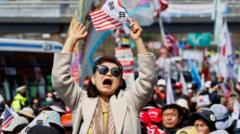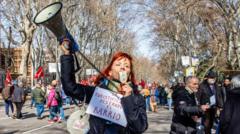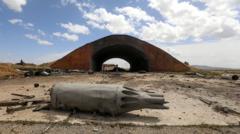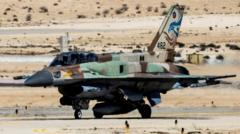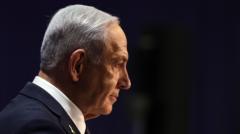The article discusses the chilling impact of recent arrests on journalists covering protests in Turkey, highlighting the story of photojournalist Yasin Akgul, who was taken into custody and faced charges for documenting anti-government unrest following the arrest of opposition mayor Ekrem Imamoglu.
Fear and Silence: Arrests of Journalists in Turkey Spark Democracy Concerns

Fear and Silence: Arrests of Journalists in Turkey Spark Democracy Concerns
Recent arrests of journalists in Turkey during protests raise alarm over the country's democracy and press freedom.
In the early morning of March 23, Yasin Akgul, a 35-year-old photojournalist with AFP, was arrested at his home in Istanbul, an event that has intensified fears over press freedom and democracy in Turkey. Just hours earlier, he had been covering mass protests sparked by the arrest of Istanbul’s opposition mayor, Ekrem Imamoglu. Akgul recounted the chilling experience of seeing numerous police officers at his door while his children were still sleeping. This arrest marked a new low for journalists in Turkey, many of whom have already faced violence and intimidation from authorities.
"I was afraid," Akgul said, reflecting on the police presence in his home, an experience he described as more intimidating than violent confrontations he had previously faced at protest sites. His arrest was part of a broader crackdown that saw seven journalists detained during dawn raids aimed at silencing dissent against President Recep Tayyip Erdogan’s regime. Akgul faced charges related to participation in illegal demonstrations, seen by many as a strategy to deter other journalists from covering the protests.
The unrest erupted after Imamoglu's arrest on corruption charges—which he denies—was viewed by many as a politically motivated move to crush potential presidential aspirations. Protesters, undeterred despite the government's attempts to suppress their voices, took to the streets in record numbers, demonstrating a fierce desire for change in an increasingly authoritarian environment.
Akgul's powerful images from the protests garnered international attention, yet also highlighted the dangers faced by journalists in Turkey. As he articulated, the message from the authorities is clear: "Don't shoot, don't speak, don't film," instilling fear that may prevent others from capturing the reality of the protests.
With around 2,000 individuals detained since the protests began, including students and journalists, the situation reflects a broader attack on civil liberties in Turkey. Human rights groups like Human Rights Watch indicate this pattern of repression aims to silence any perceived opposition, compounded by government control over the media which downplays or misrepresents these protests.
In a recent rally that drew hundreds of thousands, the opposition remains resolute, insisting they will continue their demonstrations for change. As political tensions rise, the future of Turkish democracy remains precarious and uncertain, with opposition figures urging immediate presidential elections amid fears of impending constitutional modifications by the ruling party.
As Akgul awaits the future of his case, he remains committed to his profession, believing it is crucial to tell the story of his country: “Someone needs to do this job,” he asserts. "And I think I am one of those people."
"I was afraid," Akgul said, reflecting on the police presence in his home, an experience he described as more intimidating than violent confrontations he had previously faced at protest sites. His arrest was part of a broader crackdown that saw seven journalists detained during dawn raids aimed at silencing dissent against President Recep Tayyip Erdogan’s regime. Akgul faced charges related to participation in illegal demonstrations, seen by many as a strategy to deter other journalists from covering the protests.
The unrest erupted after Imamoglu's arrest on corruption charges—which he denies—was viewed by many as a politically motivated move to crush potential presidential aspirations. Protesters, undeterred despite the government's attempts to suppress their voices, took to the streets in record numbers, demonstrating a fierce desire for change in an increasingly authoritarian environment.
Akgul's powerful images from the protests garnered international attention, yet also highlighted the dangers faced by journalists in Turkey. As he articulated, the message from the authorities is clear: "Don't shoot, don't speak, don't film," instilling fear that may prevent others from capturing the reality of the protests.
With around 2,000 individuals detained since the protests began, including students and journalists, the situation reflects a broader attack on civil liberties in Turkey. Human rights groups like Human Rights Watch indicate this pattern of repression aims to silence any perceived opposition, compounded by government control over the media which downplays or misrepresents these protests.
In a recent rally that drew hundreds of thousands, the opposition remains resolute, insisting they will continue their demonstrations for change. As political tensions rise, the future of Turkish democracy remains precarious and uncertain, with opposition figures urging immediate presidential elections amid fears of impending constitutional modifications by the ruling party.
As Akgul awaits the future of his case, he remains committed to his profession, believing it is crucial to tell the story of his country: “Someone needs to do this job,” he asserts. "And I think I am one of those people."


